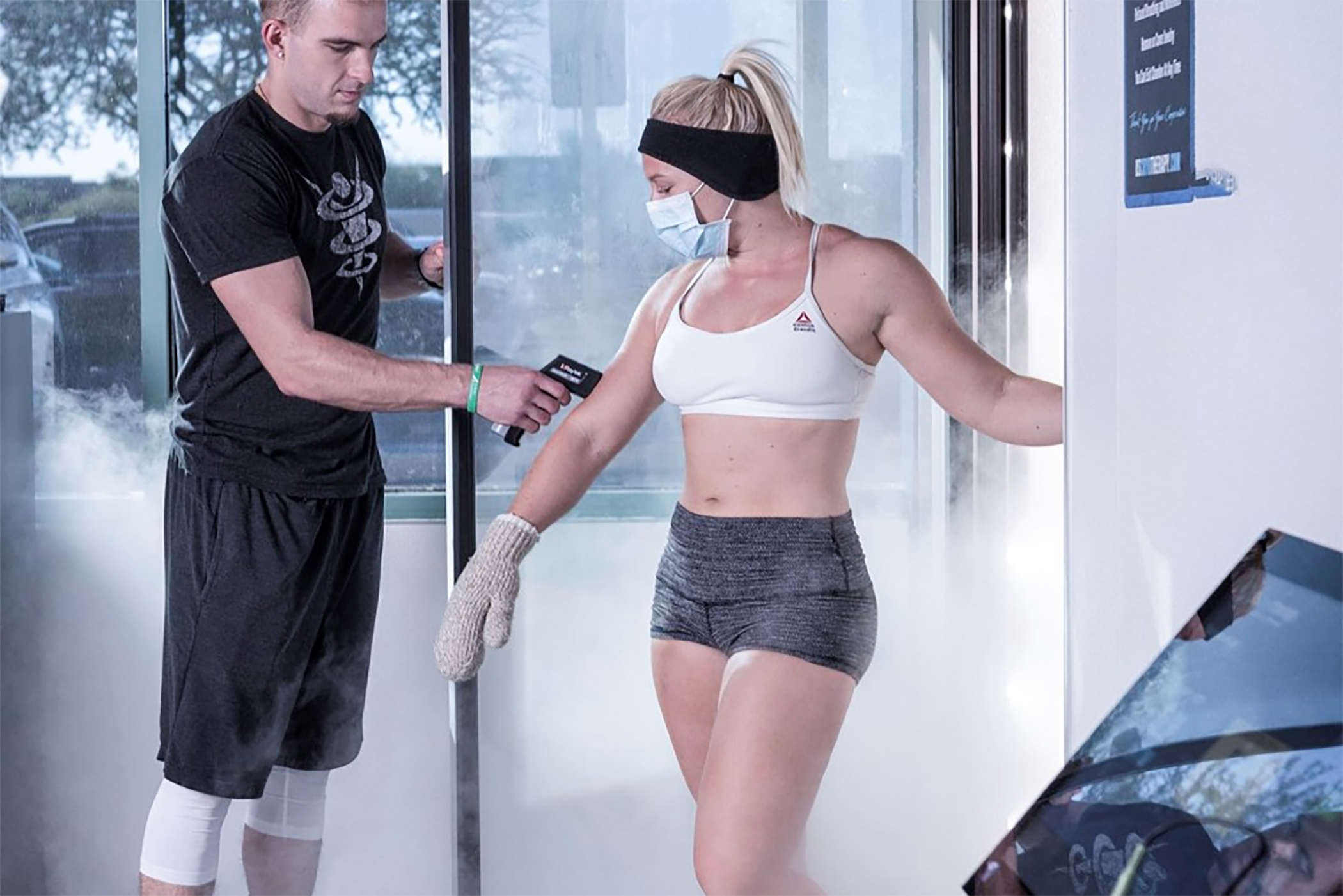Once a Novelty, Cold Therapy May Be the Next Health and Wellness Real Estate Trend

by: Richard Lawson | CoStar News
A US Cryotherapy staff member demonstrates the process of taking the skin temperature of a customer coming out of a cold therapy chamber. (Courtesy of US Cryotherapy)
With high-intensity group fitness all the rage, the next step may well be walking next door for two to three minutes of treatment employing extremely cold temperatures to speed recovery from the workout.
What started as a novelty, boutiques offering cryotherapy, sometimes called cold therapy, have started gaining mainstream traction around the country. Chains have increasingly started to expand, adding another concept to the health-and-wellness mix favored by retail real estate developers, because they drive customer traffic and offer services that cannot be easily replicated on the internet.
With cryotherapy boutiques, customers stand in a pod that fills with cold air that can be as low as negative 300 degrees Fahrenheit. Or, they can walk into a special chamber, basically a freezer, filled with cold, dry air.
The therapy started as something trendy for those who could regularly pay for single sessions costing as much as $100 each for the promise of weight loss and more youthful skin. Professional athletes using cryotherapy added to the allure.
But it’s the other touted health claims that have started pushing cryotherapy more mainstream, including relieving pain, reducing inflammation and improving circulation. Physical rehabilitation centers and other professional medical organizations started adding cryotherapy.
“It’s becoming less of a novelty and more of a standard,” said Alia Alston, founder of Atlanta-based IceBox, which has three locations in the Atlanta area and one in Tallahassee, Florida.
Alston, who started IceBox eight years ago, is among several expanding by selling franchises. She just started franchising last year and sold three locations recently to take the total in development to 34. The company brought on national real estate firm Newmark Knight Frank to find locations across the country.
IceBox isn't alone in expanding. Davis, California-based US Cryotherapy has 25 locations around the country and is adding three to five locations a quarter, said Kevin Kramer, US Cryotherapy CEO. Through a deal with the Army & Air Force Exchange Service, the company is building a location at Fort Bliss in El Paso, Texas. It already has one at Fort Hood in Texas.
To fuel growth, the company is going public on the Canadian TSX Venture stock exchange, which Kramer said could raise up to $10 million.
Meanwhile, another Atlanta-based company, Cryoshift Cryotherapy, recently sold its first franchise development area, striking a deal with Arizona entrepreneurs Kris Price and Billy Sunkenberg to find franchisees throughout the state. They plan to open two locations of their own in the Phoenix area, the first scheduled for next year.
They have owned two Orangetheory Fitness franchises for the past decade and decided to pursue Cryoshift because of that experience.
“We've seen a real shift in the mindset of our clients when it comes to properly taking care of themselves and recovery efforts,” Sunkenberg said via email. “To put it simply, cryotherapy works. Our clients will come out feeling more refreshed and energized and ready to get back into the gym faster.”
Orangetheory Fitness franchisees seem to be a good source for landing owners of cryotherapy franchises. Alston said most of the new IceBox franchisees also own Orangetheory locations.
“They understand the concept,” she said. “It’s the same client.”
Cryotherapy franchises generally look for space in retail centers that have fitness tenants, taking around 1,000-2,000 square feet of space.
But they also look at centers serving communities with strong disposable incomes. Those centers are likely to have a high-end grocery tenant anchoring them.
US Cryotherapy’s Kramer said, however, that “some of our better performing centers are in more industrial areas.” The business model is more about being a destination location and visibility isn’t as important as referrals, he said.
But because of the short amount time customers spend in the location, about 15 minutes, parking is a vital component, particularly short-term.
“It’s like picking up a to-go order for food,” said Chris Dundon, the Newmark Knight Frank Broker working with IceBox.
